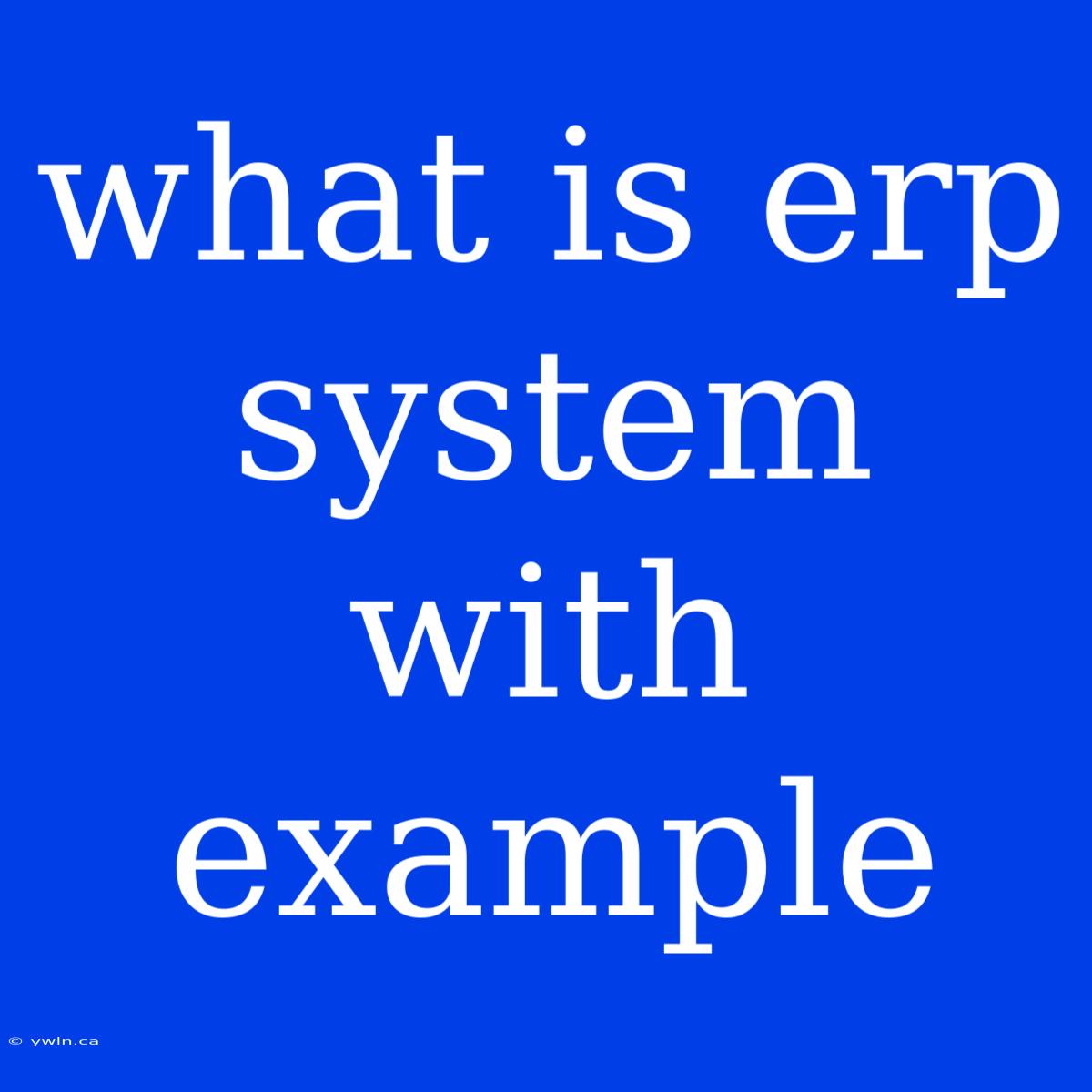Unlocking Business Efficiency: What is an ERP System and How Does it Work?
What is an ERP system? ERP systems (Enterprise Resource Planning) are comprehensive software solutions that integrate various business processes across an organization. They provide a centralized platform for managing essential functions like finance, human resources, supply chain, and customer relationship management. Think of it as a digital nervous system that connects and synchronizes all the critical operations within your company.
Editor Note: Today we delve into the world of ERP systems, exploring how they can streamline your business operations, improve decision-making, and ultimately drive growth. This guide is essential for any business owner or manager looking to enhance operational efficiency and gain a competitive edge.
Analysis: We've analyzed leading ERP solutions, reviewed industry best practices, and compiled this guide to help you understand the fundamentals of ERP systems, their key components, and how they can be leveraged to maximize your business potential.
Key Takeaways
| Key Takeaway | Description |
|---|---|
| Centralized Data Management: ERP systems unify all business data in one place, eliminating data silos and providing a single source of truth. | |
| Improved Collaboration: Shared access to data fosters better communication and collaboration among departments, leading to smoother workflows. | |
| Enhanced Reporting and Analytics: ERP systems provide real-time insights and comprehensive reporting, allowing for data-driven decision-making. | |
| Increased Efficiency: Automation of repetitive tasks and streamlined processes save time and resources, boosting overall efficiency. | |
| Improved Customer Satisfaction: Better inventory management and faster order fulfillment lead to improved customer service and satisfaction. |
What are the Core Components of an ERP System?
ERP systems typically encompass these key modules:
Financial Management:
- Accounts Payable and Receivable: Manage invoices, payments, and cash flow.
- General Ledger: Track financial transactions and generate financial statements.
- Budgeting and Forecasting: Plan and analyze financial performance.
Human Resources Management:
- Payroll: Process payroll and manage employee benefits.
- Talent Management: Recruit, onboard, and manage employee performance.
- Time and Attendance Tracking: Monitor employee hours and attendance.
Supply Chain Management:
- Inventory Management: Track inventory levels, order, and manage stock.
- Purchasing: Negotiate and purchase goods and services.
- Production Planning: Optimize production schedules and resources.
Customer Relationship Management (CRM):
- Sales Management: Track sales leads, manage opportunities, and generate reports.
- Marketing Automation: Manage marketing campaigns and track performance.
- Customer Support: Provide customer service and track inquiries.
ERP System Examples
Here are some popular ERP system providers:
- SAP: A global leader in enterprise software solutions, serving a wide range of industries.
- Oracle: Another major player offering comprehensive ERP solutions for businesses of all sizes.
- Microsoft Dynamics 365: A cloud-based ERP solution that integrates with other Microsoft products.
- NetSuite: A cloud-based ERP system designed specifically for small and medium-sized businesses.
- Infor: Offers industry-specific ERP solutions for manufacturing, distribution, and other sectors.
Benefits of Implementing an ERP System
- Increased Efficiency: Automating tasks and streamlining workflows saves time and resources.
- Improved Visibility and Control: Centralized data provides a comprehensive view of business operations.
- Enhanced Decision Making: Data-driven insights support informed business decisions.
- Reduced Costs: Streamlined processes and improved efficiency lead to cost savings.
- Improved Customer Satisfaction: Faster order fulfillment and better customer service enhance customer satisfaction.
- Competitive Advantage: By optimizing operations and leveraging data, businesses gain a competitive edge.
How to Choose the Right ERP System for Your Business
- Identify Your Needs: Determine the specific business processes you want to improve.
- Consider Your Budget: ERP systems range in price depending on features and complexity.
- Evaluate Vendor Capabilities: Research vendors and their experience with your industry.
- Seek Expert Advice: Consult with an ERP consultant to guide your decision.
FAQ
Q: What are the challenges of implementing an ERP system?
A: Implementing an ERP system can be complex and require significant time and resources. Challenges may include data migration, user training, customization, and integration with existing systems.
Q: How long does it take to implement an ERP system?
A: Implementation timelines vary depending on the size and complexity of the system, but can typically range from several months to a year or more.
Q: What are the long-term benefits of using an ERP system?
A: ERP systems can provide long-term benefits such as improved efficiency, better decision-making, increased profitability, and a competitive advantage.
Q: What are some tips for successful ERP implementation?
A: Tips for successful ERP implementation include:
- Clearly define project goals and objectives.
- Involve key stakeholders in the implementation process.
- Provide adequate training and support to users.
- Establish clear communication channels.
- Manage change effectively.
Tips for Choosing and Implementing an ERP System
- Prioritize your needs: Determine which business processes need the most improvement.
- Research vendors thoroughly: Evaluate their reputation, experience, and industry expertise.
- Get demos and test drives: Experience the software firsthand to ensure it meets your requirements.
- Develop a detailed implementation plan: Outline timelines, resources, and responsibilities.
- Provide user training and support: Ensure users are comfortable with the new system.
- Continuously monitor and evaluate: Track performance metrics and make adjustments as needed.
Summary of ERP Systems
ERP systems are powerful tools that can help businesses improve efficiency, streamline processes, and make informed decisions. By integrating various business functions into a single platform, ERP systems provide a holistic view of operations, enabling organizations to optimize performance and achieve their strategic goals.
Closing Message: Investing in an ERP system is a strategic decision that can significantly impact your business success. By carefully evaluating your needs, choosing the right solution, and implementing it effectively, you can unlock the transformative power of ERP and drive lasting growth and prosperity.

